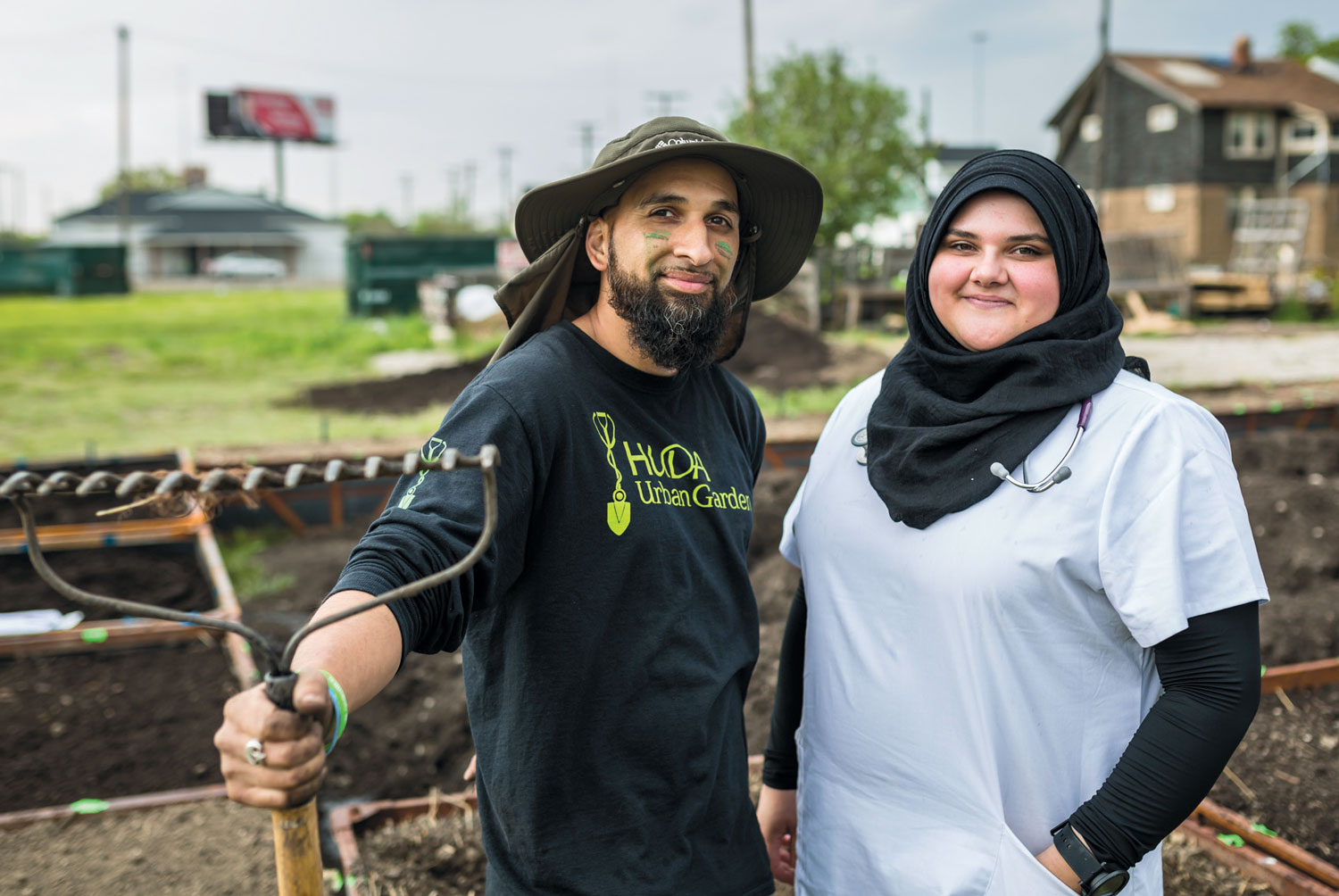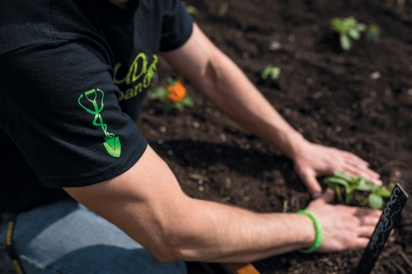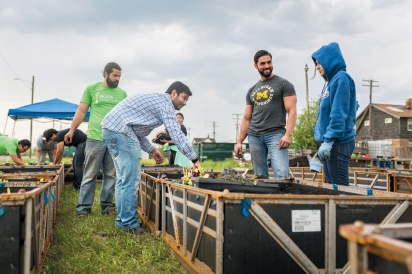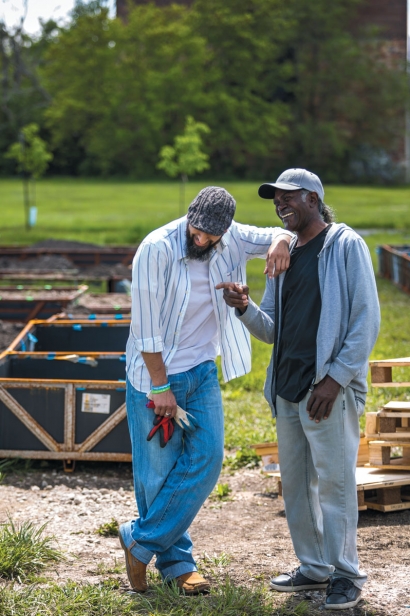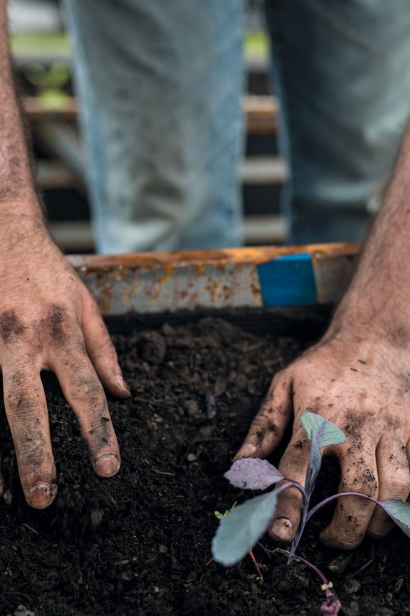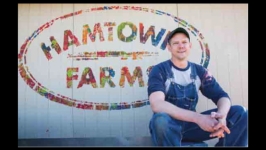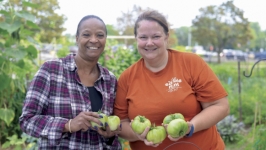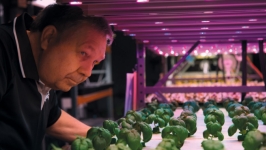HUDA Urban Garden Treats Patients with Fresh Food
On a chilly day in early May, Babar Qadri surveys an empty lot near the intersection of the Lodge and the Davison, adjacent to the HUDA Free Clinic where he works as a physician’s assistant. Dressed in blue scrubs, Qadri has a long, dark and a colorful scarf around his neck, which he wraps over his head against the cold.
The surrounding neighborhood, which sits along a border of Detroit and Highland Park, is a mix of abandoned and occupied homes and vacant lots. Across the street is a Muslim community center, and just down the street is the Detroit Repertory Theater.
Not much is growing here today, but Qadri—commonly known as Q to patients and friends—describes what, in his mind’s eye, will fill this space in a few short weeks. It’s truly form following function, with each bed dedicated to helping HUDA Clinic’s patients battle common ailments.
“We’ve broken the garden down into different blocks,” says Q. “One block is high blood pressure and arthritis, and another block is diabetes. Another one is smoking cessation and hypothyroidism, and another is nutrition.”
The garden was launched in 2013 as part of an effort to help HUDA Clinic’s patients, some of whom come from as far away as Port Huron, to not only access healthy food but to use food as part of their treatment plans. The clinic is one of the few in the state offering free access to family practice, dental, mental health, physical therapy and a nutritionist. It all started when Q began to notice a repeating pattern at the clinic.
“I noticed these patients coming in on a monthly basis, having the same issue, and the docs will just tell them, ‘Stop eating this, stop eating that,’ and then they’d up their medication,” Q recalls. “I had this thing called the Four Fs: no fried, fatty, fast, fake foods. Nothing that comes in boxes, nothing that comes in cans. Sixty ounces of water every day, 30 minutes of exercise. I can rap that off in my sleep I say it so much, right? But it was just driving me crazy because we weren’t getting any results.”
At that point, Q took a step back and began to think about why the advice wasn’t making more of an impact. “Patients would say, ‘All right, well, damn. You just took everything off my plate. I don’t know what else to eat,’” Q recalls.
So he began to incorporate food recommendations into treatment plans—fruits, fresh vegetables, barley, oats, wheats, grains. But it soon became apparent that those items were not readily accessible in the low-income neighborhoods where his patients were living.
“They’re, like, ‘All right, now you’re telling us what to put on the table, but Q, where are we going to get that from? There’s no place
around here that has that.’ That was the evolutionary process that brought about the urban garden.”
In 2013, Q built a few raised beds on the adjacent vacant lot owned by the clinic. “It started with a few pallets that we broke down and built raised beds on. Got some of our own dirt, threw it in there. Threw some tomatoes, basil and green peppers, and we just started handing out to patients,” he says. “One thing grew into another, people started hearing about it, started coming and checking out the garden. Organizations started hearing about it, started volunteering, donating in-kind ideas and products like big raised beds.”
In 2016, HUDA Garden raised $3,748 in a Patronicity crowdfunding campaign, which was matched by the Michigan Economic Development Corporation. General Motors donates raised beds. Keep Growing Detroit donates plants and seeds, and local nonprofit Buckets of Rain has helped with volunteers, materials and training. College students from all over the region volunteer and use the garden for class projects.
“Now we have this huge garden out front that we plan on feeding 5,000 people from this season alone,” says Q. Many of those people will be using the food to improve their health. Q says a common ailment the garden treats is smoking cessation.
“A lot of people smoke cigarettes. So we grow a lot of anti-smoking things, which are a lot of bitter-tasting foods that help detox the liver,” he says. “Dandelions, corn, ginger, garlic, turmeric.”
For Q, this work is an outgrowth of his Muslim faith, though he’s quick to note that the clinic, and the garden, are open to everyone. Patients come from all over the region, from all ethnic groups and all religions.
“I felt that it was my job as a Muslim to provide justice for as many people as I could, Muslim or not. I don’t care. Humanity is humanity,” he says. “When I finished [physician’s assistant] school and came to work at the HUDA Clinic, I saw that helping people here is really where my heart is. My job is to provide this community with food security and food sovereignty. If I can teach everyone how to grow their own crops, then we’ve taught the man how to fish, as opposed to feed him a fish. And it makes our job easier, and makes them more independent, and it makes them more responsible for their individual health.”
Find out more at HUDA Urban Garden


